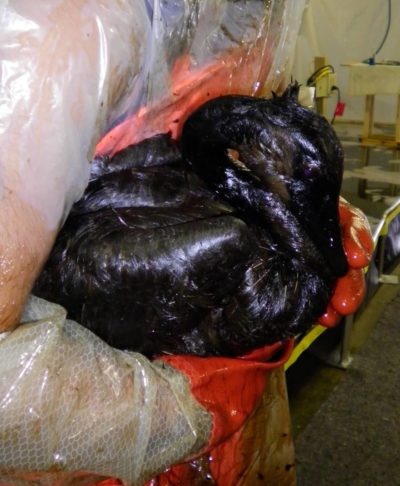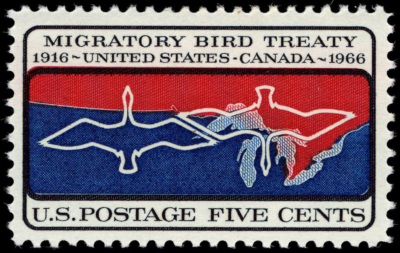During and following the inaugural Black Birders Week, you might have read a few comments online to the effect of “Don’t make my birds political!” “Birds have NOTHING to do with politics. Keep it separate.”
(Our jaws dropped to the floor, too.)
There are no two ways about it: we depend upon healthy ecosystems as people. Whether you’re doing it “for the birds” or not, the health of birds and pollinators is a concern of human health.
And politics, for better or worse, absolutely affect birds.

Osprey © Robert Black | Audubon Photography Awards
This past week, a federal judge decided to invalidate rule changes in the Migratory Bird Treaty Act made by the Trump administration that allowed industry to kill birds as long as it wasn’t intentional.
The Migratory Bird Treaty Act (MBTA), the most important law protecting birds in our country, has been gradually weakened under the Trump Administration over the past four years. To kick it up a notch, earlier this year, the Administration proposed stripping the MBTA of its ability to protect the birds that are facing more threats to their survival than ever.
A report by the State Energy and Environmental Impact Center at New York University’s school of law published in March said the Trump administration had “set its sights on watering down or outright repealing a half-dozen health and environmental rules critical to the health and welfare of all Americans as well as the planet.”

A heavily oiled Canada Goose from the 2010 Kalamazoo River oil spill.
From the U.S. pulling out of the Paris Agreement (pending this November) to the Environmental Protection Agency finalizing plans to dismantle the Clean Power Plan to cutting clean water protections to the shrinking national monuments and removal of animal and wildlife protections. . . we have hit a rock bottom in failing to be stewards of the environment like never before in this country.
We have not witnessed an Administration attack the environment like this before.
We’ve not ever seen birds at this much risk before.
We’ve also never heard a federal judge quote classical literature in her vehement ruling in protection of our native birds.
This ruling is not the end, it’s not enough, but it’s important — and it’s got momentum behind it.
The backlash of voices for birds, conservation, science, and environmental protection built a chorus of resistance to the proposed stripping of the Migratory Bird Treaty Act. Give industry a free pass to harm birds and the environment without consequence?
No.
“It is not only a sin to kill a mockingbird, it is also a crime,” wrote federal Judge Valerie Caproni in her ruling on Aug. 11. “That has been the letter of the law for the past century. But if the Department of the Interior has its way, many mockingbirds and other migratory birds that delight people and support ecosystems throughout the country will be killed without legal consequence.”
The clarity through which this federal judge speaks is, ironically, at odds with the very agency, the U.S. Fish and Wildlife Service, that is tasked to conserve, protect, and enhance fish, wildlife, plants, and their habitats for the continuing benefit of the American people.
What does this mean for Michigan birds, Michigan Audubon, all of us? It means we have to keep our finger on the pulse, so to speak, of these issues as a collaborative community, and it doesn’t mean we stop the work, individually and collectively, that we must do as advocates for birds and the native ecosystems we all depend on.
It can be hard to find and feel uplifting news when you’re tuned into the health and protection of the natural world and wildlife. This moment is one that is symbolic of a tide change, one that mirrors the efforts of our advocacy back to us from time to time, encouraging us to be a part of the work and the sustainable solutions that benefit people and birds.
I urge you to read the Washington Post piece yourself — it’s not only important information that we’ll help you stay connected with, but it’s important symbolically to take note of this small victory of voices: for Judge Valerie saying no, industry cannot and will not be permitted to dissipate migratory bird populations and their critical, ever-fragmented habitats throughout the United States.
 It’s important to celebrate, take note, and keep this momentum growing.
It’s important to celebrate, take note, and keep this momentum growing.
On behalf of Michigan birds, who know no political bounds, we are one voice of that chorus that fought to see this law protected.
Thank you to that collection of voices who said no, who helped usher this powerful decision onto the national stage at a critical time.
Thank you, Judge Valerie Caproni, for protecting the law that helps us continue to protect the birds we need, value, and love.
If you’re reading this, thank you for doing your part, whatever that looks like on a given day. Keep looking up. Keep waking up.
Heather Good
Executive Director
Judge stops Trump rules that did away with penalizing companies that kill birds
Interview featuring Michigan Audubon Executive Director Heather Good by Lester Graham of Michigan Radio


